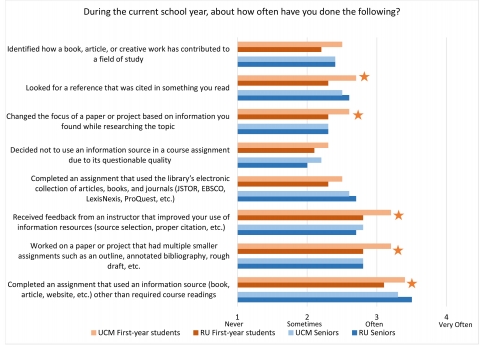NSSE 2015 Brief Report: Information Literacy
Last spring, UC Merced first-year students and seniors completed the National Survey of Student Engagement.
Fourteen percent of those invited to take the survey responded. This brief report focuses on student experiences with information literacy — defined as student use of information — and compares responses of UC Merced students with students at public research universities with high (but not very high) research activity.
The figure below compares the responses of UC Merced first-year students to other research university (RU) first-year students and compares UC Merced seniors to RU seniors.

Figure note: Values are scale averages (1 = never, 2 = sometimes, 3 = often, 4 = very often). Corresponding first-year students (UC Merced vs. RU) and senior (UC Merced vs. RU) bars that are starred indicate a statistically significant difference.
Key Findings:
- UC Merced first-year students had higher average information literacy compared to other RU freshmen in five of the areas assessed and similar average information literacy in the remaining three areas. For example, UC Merced first-year students were more likely to say that they “received feedback from an instructor that improved their use of information resources” compared to other RU freshmen.
- UC Merced seniors had similar levels of information literacy compared to other RU seniors in all eight areas. For example, UC Merced seniors were just as likely as other RU seniors to say they had “worked on a paper or project that had multiple smaller assignments such as an outline, annotated bibliography, rough draft, etc.”
- The most highly endorsed item for both UC Merced first-year students and seniors was that they “completed an assignment that used an information source other than required course readings.”
- The least highly endorsed item for both UC Merced first-year students and seniors was that they “decided not to use an information source in a course assignment due to its questionable quality.”
Limitations:
- Only 14 percent of the students invited to complete the survey did so. This means that the data might not be applicable to the majority of UC Merced first-year students and seniors.
- The other RU group only contained six universities meaning that the comparison group is not nationally representative of all RUs.
For more information, contact Cinnamon Danube at Institutional Research and Decision Support (IRDS) or visit the IRDS website.
